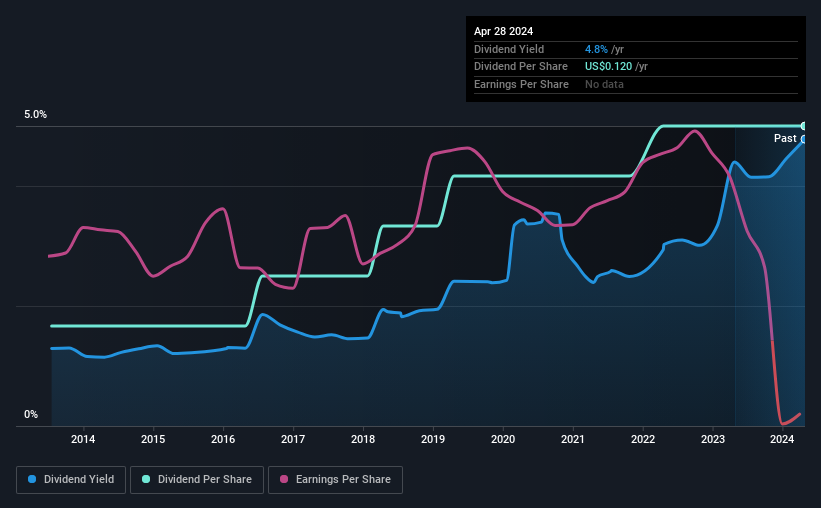Dividend Investors: Don't Be Too Quick To Buy AmeriServ Financial, Inc. (NASDAQ:ASRV) For Its Upcoming Dividend
AmeriServ Financial, Inc. (NASDAQ:ASRV) stock is about to trade ex-dividend in 4 days. The ex-dividend date is one business day before the record date, which is the cut-off date for shareholders to be present on the company's books to be eligible for a dividend payment. The ex-dividend date is important because any transaction on a stock needs to have been settled before the record date in order to be eligible for a dividend. Meaning, you will need to purchase AmeriServ Financial's shares before the 3rd of May to receive the dividend, which will be paid on the 20th of May.
The company's next dividend payment will be US$0.03 per share, on the back of last year when the company paid a total of US$0.12 to shareholders. Based on the last year's worth of payments, AmeriServ Financial stock has a trailing yield of around 4.8% on the current share price of US$2.51. Dividends are an important source of income to many shareholders, but the health of the business is crucial to maintaining those dividends. As a result, readers should always check whether AmeriServ Financial has been able to grow its dividends, or if the dividend might be cut.
View our latest analysis for AmeriServ Financial
If a company pays out more in dividends than it earned, then the dividend might become unsustainable - hardly an ideal situation. AmeriServ Financial reported a loss after tax last year, which means it's paying a dividend despite being unprofitable. While this might be a one-off event, this is unlikely to be sustainable in the long term.
Click here to see how much of its profit AmeriServ Financial paid out over the last 12 months.
Have Earnings And Dividends Been Growing?
Companies with falling earnings are riskier for dividend shareholders. If earnings decline and the company is forced to cut its dividend, investors could watch the value of their investment go up in smoke. AmeriServ Financial was unprofitable last year and, unfortunately, the general trend suggests its earnings have been in decline over the last five years, making us wonder if the dividend is sustainable at all.
The main way most investors will assess a company's dividend prospects is by checking the historical rate of dividend growth. Since the start of our data, 10 years ago, AmeriServ Financial has lifted its dividend by approximately 12% a year on average.
We update our analysis on AmeriServ Financial every 24 hours, so you can always get the latest insights on its financial health, here.
To Sum It Up
Is AmeriServ Financial worth buying for its dividend? First, it's not great to see the company paying a dividend despite being loss-making over the last year. Worse, the general trend in its earnings looks negative in recent years. These characteristics don't generally lead to outstanding dividend performance, and investors may not be happy with the results of owning this stock for its dividend.
Having said that, if you're looking at this stock without much concern for the dividend, you should still be familiar of the risks involved with AmeriServ Financial. For example, AmeriServ Financial has 3 warning signs (and 1 which is potentially serious) we think you should know about.
Generally, we wouldn't recommend just buying the first dividend stock you see. Here's a curated list of interesting stocks that are strong dividend payers.
Have feedback on this article? Concerned about the content? Get in touch with us directly. Alternatively, email editorial-team (at) simplywallst.com.
This article by Simply Wall St is general in nature. We provide commentary based on historical data and analyst forecasts only using an unbiased methodology and our articles are not intended to be financial advice. It does not constitute a recommendation to buy or sell any stock, and does not take account of your objectives, or your financial situation. We aim to bring you long-term focused analysis driven by fundamental data. Note that our analysis may not factor in the latest price-sensitive company announcements or qualitative material. Simply Wall St has no position in any stocks mentioned.

 Yahoo Finance
Yahoo Finance 
